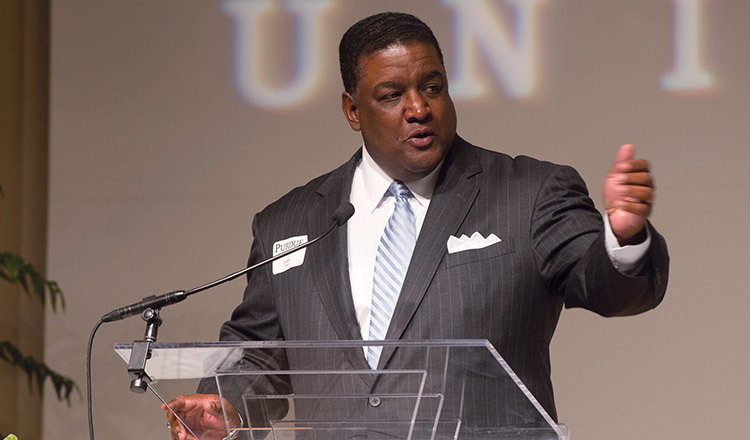At 17, he was at the lowest point of his life. The young man did not know he would become one of the most highly respected and successful leaders in his Houston community and elsewhere, and that he would work for a top financial firm for 10 years, own and operate numerous quick service restaurants, become president of Zaxby’s Houston LLC and become a limited partner in the Houston Astros, a major league baseball team.
He didn’t know that his personal life would be just as successful — that he would marry Mychelle, and they would have two children: Austin, a 2014 graduate of Harvard, and Erin, an undergraduate at the University of Colorado, and celebrate their 26th anniversary later this year.
But what he did know at that time was that his high school football team just lost the last play-off game of the season. As a senior and captain of the football team, the loss of the game hit the very core of his being. He felt the loss for several reasons, but mostly because he thought football was his opportunity out of the housing project where he grew up and his ticket into college.
As a child from Altgeld Gardens, a federally supported Chicago housing project where “street gangs recruited … like corporations do at the best colleges” he had much to overcome.
His desire to better himself had just received a crushing blow.
With that uncharacteristically negative mindset, Shawn Taylor (M’82) was greeted by his mother outside the stadium and feeling as if all hope was gone.
Except that Taylor’s mother, Evangeline “Vangie” Irving, already had a new plan in action. She had arranged for a home visit with Cornell A. Bell, so he could talk about the “Business Opportunity Program” with them.
“When Dr. Bell entered my home, my first emotion was surprise and then embarrassment because we didn’t have much furniture,” Taylor says. “It was clean, there just wasn’t very much of it.”
Within minutes, the surroundings of the apartment faded into the background.
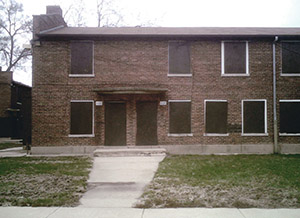
Bell, a former Gary, Indiana, high school principal who was recruited in 1969 by Purdue University to lead the newly created Business Opportunity Program. The program is now called the Dr. Cornell A. Bell Business Opportunity Program (BOP).
The program was still fairly young in 1977 when Bell walked into Taylor’s high school.
“Dr. Bell came up to speak with our school counselors to look for promising students for the program and one of the counselors told him about me and my best friend,” he says. “By luck, my mom and my friend’s mom happened to be in the hallway outside the school counselor’s office.”
Once introductions were made, it did not take long for Taylor’s mother to initiate a meeting between Bell and Taylor.
“I learned later that my high school was just one of many that Dr. Bell visited to recruit promising students for the BOP program. But for me it was a life-changer.”
—Shawn Taylor (M’82)
“I learned later that my high school was just one of many that Dr. Bell visited to recruit promising students for the BOP program. But for me it was a life-changer. Meeting him changed my life and the program changed my life,” Taylor says. “I grew up in a single-parent household and my mom worked part-time for the post office slinging mail bags around despite her arthritis and we relied on welfare.”
His mother did much more than that for her family.
A mother’s devotion
“No matter what, my mom wanted all four of her children to have the opportunities she didn’t. The schools were not districted by geography so she did not send any of us to the closest neighborhood school but enrolled us in a better school that was quite a distance from our home.”
As a student, Taylor rode three separate city buses, each way, to get back and forth to his school and left home at 6:15 a.m. and didn’t get home until 7 p.m.
“My mom was strict but she had unwavering faith, gave us unconditional love, and she never said anything discouraging or put us down,” he says. “She was always there for me in everything I did. She was my mom.
“I lost her two years ago and that wasn’t easy.”
His mother was known for her humanitarian efforts outside the home as well. She worked tirelessly to improve the Altgeld Gardens neighborhood, which was one of the first public housing developments ever built in the US. It was constructed in 1945 to meet the needs of returning African-American veterans of World War II.
In the 1980s, Irving helped a local community organizer named Barack Obama lead a grassroots campaign to clean up Altgeld Gardens — both in appearance, but more importantly in asbestos removal. The complex still houses 3,400 residents and is considered a historic landmark.
“This was President Obama’s first community project and my mom helped and she never said anything to me about it,” Taylor says. “That’s the way she was, always quietly helping others. She inspired all four of us and she was kind to everyone who was fortunate to meet her.”
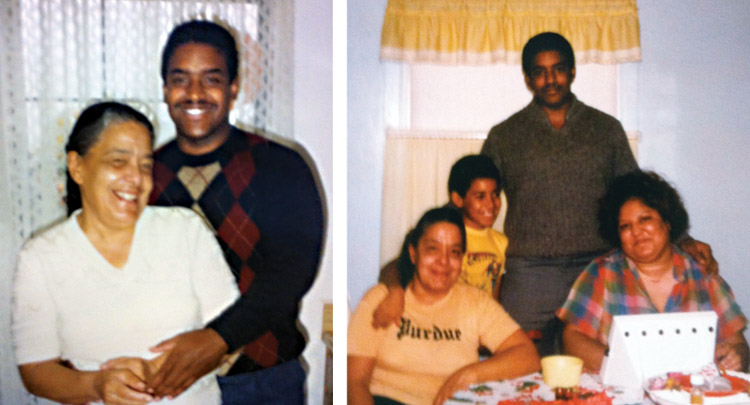
Becoming a Boilermaker
Although Taylor did play football at Purdue briefly, it was Bell and the Business Opportunity Program that helped him become a member of the Boilermaker family.
“The BOP program was critical to my success,” he says. “There were 5,000 students in my high school and two were white. When I came to Purdue, it was a complete crossover and I was in culture shock. Culturally, my life became the exact opposite of what it was the first 18 years of my life.
“The BOP program included a summer program in which we took 12 hours of classes. There were 35 students in my BOP class of which many are my best friends today.”
Still, it wasn’t an easy ride. Professors emeritus and emerita Al and Martha Chiscon became just two of several mentors who helped Taylor.
“Al and Martha became like a second family to me, and when I visit West Lafayette to this day, I stay at their home,” Taylor says.
The Chiscons were immediately impressed with Taylor’s poise and intelligence.
“Shawn was a student in my biology and human affairs course and he was deeply engaged in football and his studies so he was busy all the time,” Al Chiscon says. “I worried about the load he was carrying. He used to come to my office and we would talk about the coursework or other things going on in his life.
“Well, I kept a big, green over-stuffed chair in my office for students. Shawn would come in and sit down in the chair. Once when we were talking and I said something and Shawn didn’t respond, so I looked at him and he was sound asleep in the chair because he was so sleep deprived.”
Taylor’s mother also called the Chiscons because she was worried about him over-extending himself.
“I told Shawn that he would have to give up something and I hoped it wouldn’t be academics.”
At that point, Taylor gave up football and devoted himself to his studies. Al Chiscon offered him the opportunity to be an undergraduate teaching assistant.
“Dr. Chiscon helped to change the trajectory of my life,” Taylor says.
“This was unusual because he was an undergraduate student, but he was better than some of my graduate assistants,” Al Chiscon says. “He has always been very much his own man and highly successful at everything he endeavors to do.”
Martha Chiscon says that Taylor is like a son to them.
“Shawn was one of those students who you knew was learning every day and that he would do something special,” she says. “Half the battle of going to college is being able to get by and listen to good advice — Shawn did that.”
Career opportunities
Taylor has had numerous careers in his lifetime. He spent 10 years with Arthur Andersen in Dallas, and became the first African-American manager in the history of that office. In 1996, he founded Family EATS, a limited partnership which owned and operated 33 Taco Bell restaurants, had nearly $30 million in sales and more than 500 employees in the Houston area. After selling the restaurants in 2007, he decided to retire and focus on helping others.
“I invested much of my time to nonprofits that focused on education for high school and college students,” he says.
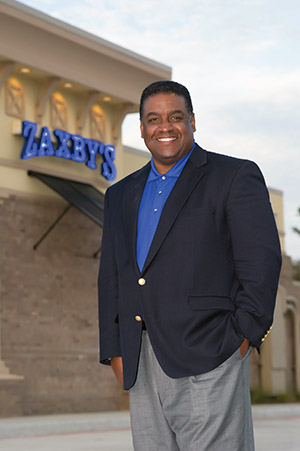
In 2011, he and other Houston business leaders acquired the Houston Astros, a major league baseball team.
“I’d known Jim Crane for 10 years and felt this was a good opportunity to re-brand myself and do something special,” Taylor says.
Crane said he approached Taylor because of his natural leadership ability.
“Shawn and I got to know each other through golf and managing some events to benefit various organizations,” Crane says. “I always know when Shawn is involved that he will drive it from start to finish — I just let him do what he does, because he does it so well.”
When Taylor oversaw the 2013 Astros Foundation Golf Classic to benefit the Houston Astros’ Urban Youth Academy, the event raised nearly $300,000 for the academy.
Also that year, Taylor expanded his interests even more by becoming became president of Zaxby’s Houston, a fast casual dining restaurant franchise. Zaxby’s Houston currently owns three locations with plans to expand to 30. There are more than 600 Zaxby’s locations in 13 states. The company is known for its outstanding chicken.
“I ate at a Zaxby’s and loved it,” Taylor says. “So my partner and I started in the Houston market in February 2013.”
Creating opportunities for others
Even though Taylor returned to a full-time career with Zaxby’s, he remains a frequent speaker before high school and college students.
“I tell them that it’s important to work hard and be successful, but don’t sacrifice being a great parent and spouse in the process,” Taylor says.
At Purdue, Taylor is a frequent speaker and in particular for the Dr. Cornell A. Bell Business Opportunity Program.
“Shawn’s contributions are immeasurable financially, but more importantly in his time and commitment to helping students at Purdue,” says Darren Henry (ME’02, MBA’07), current managing director and an alumnus of the program. “In January, we had a BOP student from the Houston area whose father passed away. Shawn heard about it and he went to the funeral to offer support. This meant so much to the student. He really helps make BOP a family.
“Because of people like Dr. Bell and Shawn, the BOP program is one of the most successful at Purdue. We have graduated more than 1,400 students in its 46 years.”
Taylor also serves on the KIPP Houston Public Schools Board of Advisors, a nonprofit that assists one of the largest open-enrollment, college-preparatory public charter schools network in the country.
“Our mission is to prepare underserved children for success in college and life, and Shawn is highly engaged with us to do just that. We don’t just get our KIPPsters to college, but through college,” says Mike Feinberg, co-founder of KIPP. “Eight years ago we had a few hundred students. Now we are a 20-school network with 11,000 students, and we expect to grow to 50 schools with 30,000 students in the next 15 years.
“Shawn is helping make this happen at the strategic level, and at the ground level, it is so important for our kids to see someone like Shawn who comes from a similar background as many of them and who has had so much success.”
Remembering his past
In the spring of 2013, Taylor visited Chicago teenagers. After he finished his presentation he drove to his old Altgeld Gardens neighborhood.
“I looked around and watched the residents. I thought about all of the people who lived there and never got out, never knew a different sort of life,” he says. “And it hit me how close I came to never leaving and not taking the path I did. It could have gone the other way so easily. It was different for me because of my mom, my high school football coaches Bernie O’Brien and John Potochi, Dr. Bell, and Purdue. I’ve been blessed.
“Now it’s time for me to move from being successful to creating a significant legacy.”
Dr. Cornell A. Bell Business Opportunity Program
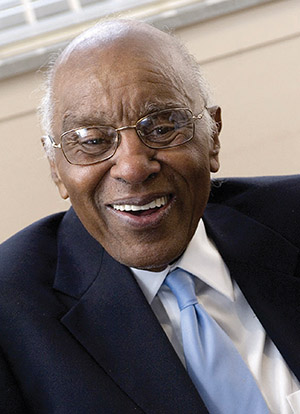
The Dr. Cornell A. Bell Business Opportunity Program was established in 1968 in the Krannert School of Management by then-Dean John Day to help foster a more diverse student body at Purdue University. The program serves as a foundation to provide scholarships, academic advising and career networking, and to promote student diversity efforts. As its first director, Bell led the program for 37 years until his retirement in 2006. He is recognized for recruiting hundreds of graduate and undergraduate students to the West Lafayette campus. The program currently has a 100 percent one-year retention rate for Purdue enrollees and an 87 percent five-year graduation rate. In 2013, 53 percent of BOP freshman members made the dean’s list or semester honors for a 3.5 GPA average after their first semester. Current managing director is Darren Henry.
When Taylor speaks to high school and college students, he hopes to inspire them to have:
Big dreams: Always focus on the possibilities and the future.
Courage: Move out of your comfort zone and dare to be different.
Commitment:Work hard, focus on your faith, family, and community, and don’t give in to excuses.

